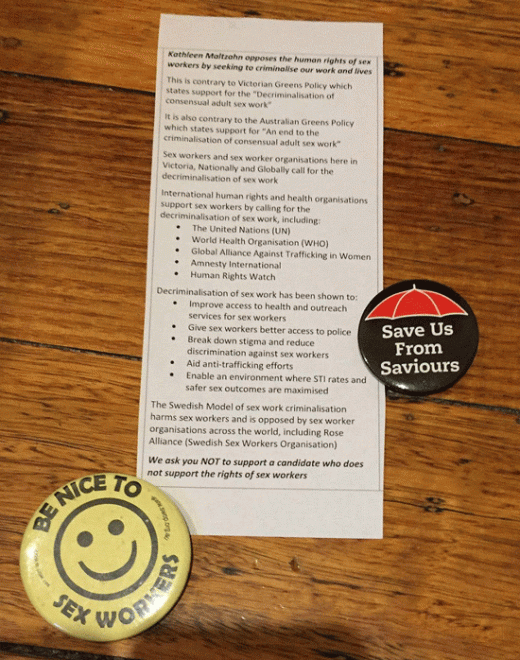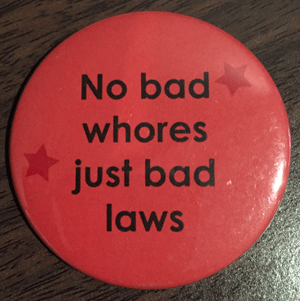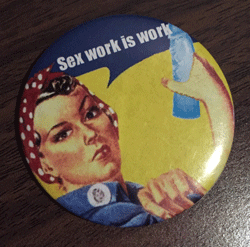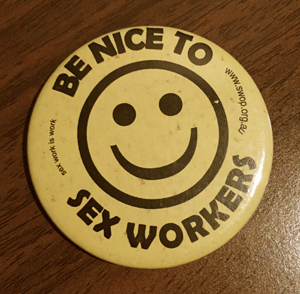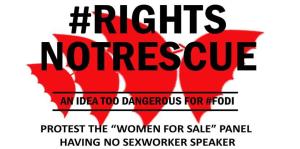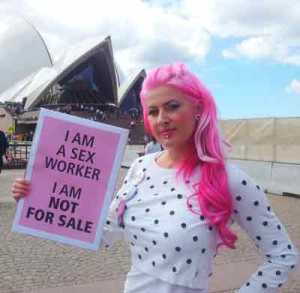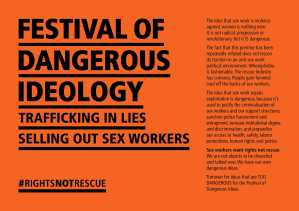
Last night local Victorian sex workers protested a Victorian Greens event hosting candidates who are running for pre-selection in the electorate of Richmond.
Why would sex workers be motivated to do this?
Sex workers and sex worker organisations world-wide call for the full decriminalisation of our work, as do human rights and health organisations around the world.
Victorian Greens policy actually supports the “Decriminalisation of consensual adult sex work”, and Federal Greens policy indicates support for “An end to the criminalisation of consensual adult sex work”.
However, the Victorian Greens have repeatedly run a candidate in the seat of Richmond who opposes both the Victorian Greens and Federal Greens policy on sex work. Kathleen Maltzahn, founder of anti-sex work organisation Project Respect, has run as the Greens candidate in Richmond in the 2010 and 2014 Victorian State Elections and is again in the running to be selected as the candidate for the upcoming election in 2018.
So, sex workers are concerned that the Victorian Greens are – yet again – seeking to run a candidate that opposes the Greens own policy on sex work, a candidate who opposes what is recognised as the best practice model for sex industry regulation.
So why are the Greens doing this? Their own policy on the issue is clear and one would think that running a candidate who opposes that policy, who opposes the human rights of a marginalised community might be something the Greens would care about.
So, sex workers went to the event last night to ask this question. We stood outside the event asking people entering to speak to us about the issue and offering them flyers explaining our concerns. We even saw Kathleen Maltzahn when we first arrived (who given the long history of sex workers protesting her opposition to sex workers rights, recognised some of us from prior protests), we gave her a flyer and explained why we were there – so the Greens were aware of our presence and the reason for it almost immediately.
What was striking was the reaction of a small number of Greens members. On realising we were there the Greens kept the building locked and posted ‘sentries’ at each entrance. We overheard one of the people being put on ‘sentry’ duty being told by another Greens member to “watch them and make sure no one talks to them”. The Greens member who gave this instruction came out a few minutes later and accosted me, trying to snatch the flyers I was holding from my hand, grabbing my hand (with the flyers in it) and refusing to let go for an uncomfortable length of time (literally uncomfortable, squeezing my hand as hard as possible trying to get me to drop the flyers). The same Greens member later stood on a sex workers foot while attempting to prevent them from talking to people (although it seemed this may have been accidental).
Many people entering did take our flyers and many also stopped to talk to us about the issues. But why did the Victorian Greens permit behaviour so hostile towards protesters? After all we were there to ask them to select a candidate who supports their own policies – a pretty reasonable request.
Later in the evening, after the meeting had begun another group of sex workers attempted to enter the meeting to raise concerns, only to be physically assaulted by a different Greens member, who shoved one worker and threw another to the ground.
The Greens then called the police, who later showed up and rather ironically ended up taking a report from one of the assaulted workers about the Greens actions.
The Victorian Greens have previously called for people to “defend your right to protest” and opposed changes to the Summary Offences and Sentencing Amendment Bill that extended police powers against protesters in Victoria.
So why is a party whose own policies support sex workers human rights, who supports the right to protest, reacting so violently when people exercise that right? Why do the Victorian Greens object to sex workers pointing out that the Victorian Greens have in the past and may again, run a candidate who rejects part of their own policy platform?
It’s a good question and it is well beyond time for the Victorian Greens to have an answer.
